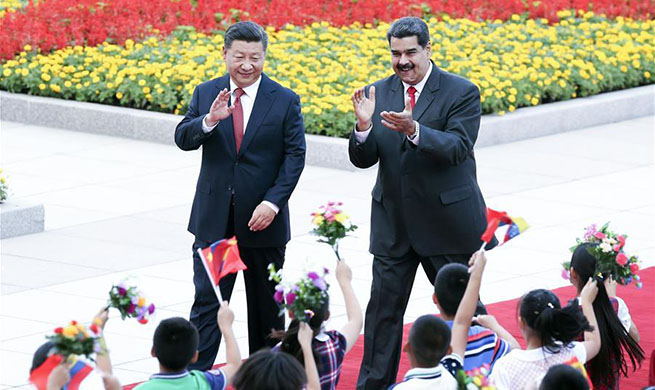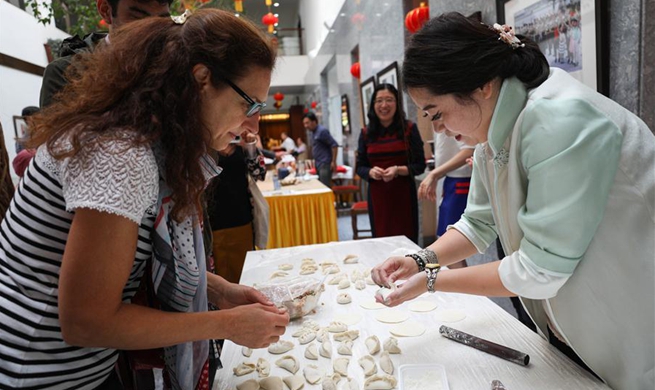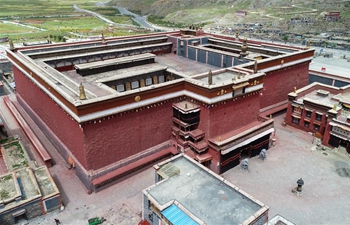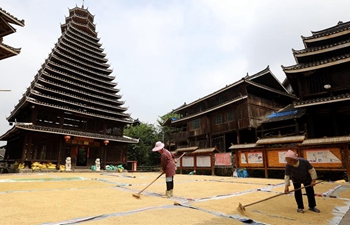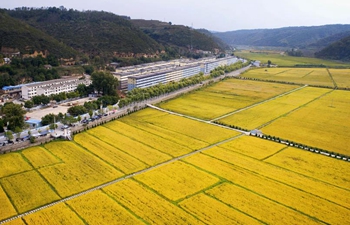BAGHDAD, Sept. 15 (Xinhua) -- The Iraqi lawmakers on Saturday elected Mohammed al-Halbousi as parliament speaker and one of his two deputies, taking a crucial step in forming the government for the next four years.
The newly-elected Iraqi parliament resumed its session around noon under the chairmanship of Mohammed Zayni, the eldest member of the parliament. The session was held with the attendance of 298 lawmakers out of the 329-seat parliament.
Halbousi, former governor of Anbar Province, was elected as parliament speaker with 169 votes, while his competitor, former Defense Minister Khalid al-Obeidi, won 89 votes.
Other Sunni competitors, former speaker Osama al-Nujaifi and Mohammed al-Khalidi, garnered lower numbers of votes.
On Friday, the Sunni parliamentary bloc National Axis Coalition nominated Halbousi as speaker in Iraq's next parliament.
"We declare to the Iraqi people and our partners of the political blocs our nomination to Mohammed Reikan al-Halbousi as our candidate for speaker, as we are the bloc that has the biggest number of members in parliament," Ahmed al-Jubouri from the Sunni coalition said in a statement at a press conference in Baghdad.
According to the Iraqi constitution, the parliament must elect its speaker, along with his first deputy and second deputy, by an absolute majority of all lawmakers through direct secret ballot.
Halbousi was born in 1981 in Garma, a town near the city of Fallujah, some 50 km west of the capital Baghdad. He obtained Master degree in civil engineer from Mustansriyah University in Baghdad in 2006.
Halbousi secured a seat in the Iraqi 2014 parliamentary elections and had been a member of parliament until Aug. 29, 2017 when the Anbar's provincial council voted by majority to elect him as governor of the province.
In May 12 parliamentary elections, Halbousi again won a parliament seat and was elected on Saturday as speaker of the parliament.
According to the power-sharing system in Iraq, the first and second speaker deputy must be from the Shiite community and the Kurds, respectively.
Hassan Kareem al-Ka'bi, from the parliament bloc Alliance Toward Reforms, backed by the Shiite cleric Moqtada al-Sadr, was elected as the first speaker deputy with 210 votes.
However, the lawmakers failed to elect the Kurdish deputy, as none of the candidates garnered the absolute majority of 165 votes in the first round.
According to the law, the lawmakers should conduct another round of direct secret ballot, in which the winner only needs the largest number of votes.
But the temporary speaker later delayed the parliament meeting to 1 p.m. (1000 GMT) on Sunday.
The parliament should have elected a speaker and two deputies during its first meeting on Sept. 3, but failed over the deep division among political blocs.
In addition, the parliament will also soon elect the president from among the candidates by a two-third majority of its members.
According to the Iraqi constitution, the newly elected president will ask the largest alliance to form a government within 30 days.
According to the power-sharing system, the president should be from the Kurds, the speaker from the Sunnis and the prime minister from the Shiites.
However, the political blocs in parliament have yet to end their tough negotiations over forming the largest alliance to establish the government for the next four years.
Both the Alliance Toward Reforms, backed by Sadr and outgoing Prime Minister Haider al-Abadi, and the Conquest Alliance, headed by paramilitary Hashd Shaabi leader Hadi al-Ameri and Nuri al-Maliki, claim to be the largest alliance in parliament.










